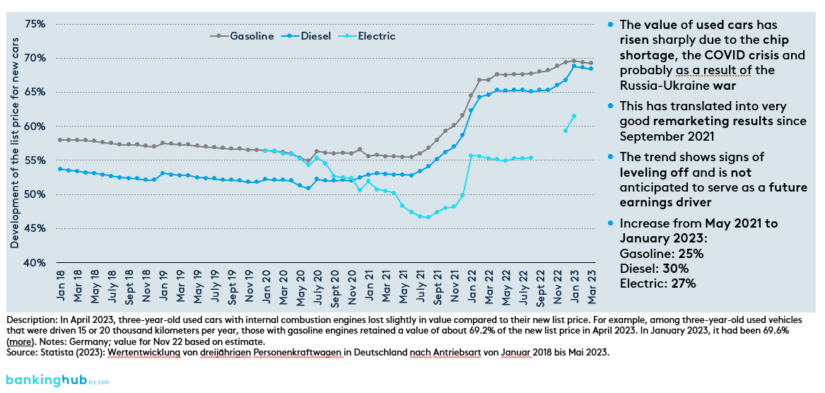|
LISTEN TO AUDIO VERSION:
|
Remarketing as a revenue driver in the past
In the past two fiscal years, the sale of leased vehicles at the end of their contract term, known as remarketing, played a pivotal role in generating revenue for many fleet leasing companies. Consequently, the pricing of used cars directly impacts the profitability of these companies.
Several factors have contributed to the increase in prices for both used and new vehicles since 2021:
- Production interruptions and supply bottlenecks caused by the COVID crisis resulted in reduced supply and increased demand.
- The chip crisis also affected vehicle production as vital components were unavailable.
- The Ukraine conflict created geopolitical uncertainties, leading to rising commodity prices and disruptions in the supply chain. This significantly curtailed the production of new cars, thus driving up the demand for used cars as well as their prices.
- Between May 2021 and January 2023, the price of gasoline cars increased by 25%, diesel cars by 30%, and electric cars by 27%[1] in the German market. As a result, fleet leasing providers have enjoyed robust financial results from their remarketing activities since September 2021.
However, the upward trend in used car prices is expected to level off as production has picked up again since November 2022. In conjunction with rising prices for new cars[2], remarketing will no longer be a reliable source of significant revenue, according to zeb’s opinion. To counterbalance the decline in revenue from remarketing activities, it is therefore advisable to shift the focus to the potential of interest income, which becomes increasingly attractive as the number of newly registered cars in the fleet industry[3] continues to rise.
On a positive note, the increase in vehicle prices means that even if sales volumes remain unchanged, total turnover, to which the interest margin can be applied, is expected to be higher. In conjunction with increased interest rates, this leads to higher refinancing costs, but also allows for a higher customer interest rate and thus improved margins.
Nevertheless, remarketing remains an important factor because, when carried out effectively, it can shorten selling times and increase residual values through meticulous car detailing, targeted marketing via streamlined processes, and the use of professional sales channels.
Staffing costs and process improvements are key levers
Fleet leasing companies struggle with high costs due to a historically large number of manual processes and associated staffing costs. These costs are influenced by various factors, including the complexity of contract management, the need for vehicle fleet expertise and customer service, and the demand for comprehensive, personalized customer support throughout the lease term. Standardizing and digitalizing processes is therefore essential, particularly in areas such as contract management, vehicle pick-up and return, and claims settlement.
Investments in suitable technologies, such as fleet management systems or the digitalization of the invoicing process, i.e. the digital handling of incoming and outgoing invoices, can streamline workflows and boost productivity. Implementing self-service solutions can help reduce staffing requirements. For example, customers can manage contracts and requests themselves through a customer portal. In addition, continuous staff training and development are important for sharing expertise and promoting efficiencies.
BankingHub-Newsletter
Analyses, articles and interviews about trends & innovation in banking delivered right to your inbox every 2-3 weeks
"(Required)" indicates required fields
Service management offers significant potential
The automotive market is volatile and depleted due to price fluctuations, supply availability issues and emerging trends such as car sharing. In this challenging market environment, the expansion of service management, i.e. the planning, organization and control of all services offered as part of the fleet leasing business, presents promising growth opportunities. This includes improving the quality of services such as maintenance, repairs, tire changes and fuel management as well as insurance solutions. By extending the relationship with fleet management customers beyond the contract term, companies can increase turnover and margins.
A comprehensive analysis of customer needs enables the development of individual service packages tailored to specific customer segments along the purchased services. This means that standardized and largely digitalized processes can be utilized for customers subscribing to basic packages, thus keeping operating costs low. Additionally, targeted management of existing customers facilitates upselling and cross-selling.
To fully realize the potential of service management, the utilization of self-service portals and user-friendly interfaces is crucial, as they enable data-driven reporting and analysis of customer services and satisfaction. A transparent and easily accessible overview of their service history, contract details and consumption also increases customer convenience.
By effectively using customer data, fleet leasing companies can also broaden their position in the value chain through partnerships and the provision of non-car-related services. For instance, offering additional services as part of mobility concepts has gained traction in the current market. In the role of an intermediary, partnerships with car-sharing providers can generate additional earnings on a commission basis while offering complementary solutions to the customer. By catering to a wide range of customer needs beyond traditional leasing, fleet leasing companies strengthen customer relationships and foster loyalty, as customers perceive the leasing company as a single point of contact for their mobility needs (additional services are conceivable as part of the mobility concept).
In summary, to maintain a competitive position in the market and ensure long-term success, it is imperative for fleet leasing companies to implement effective service management strategies, conduct targeted data analysis and reporting, and embrace holistic mobility concepts.




